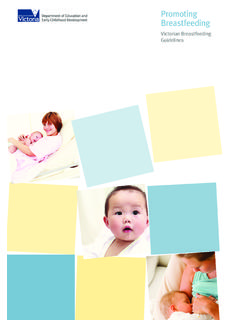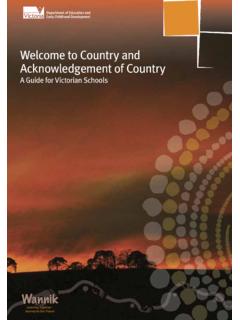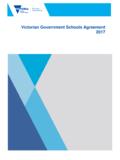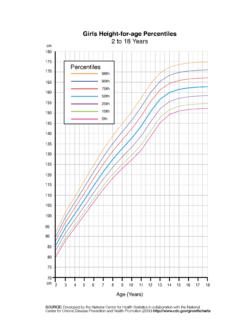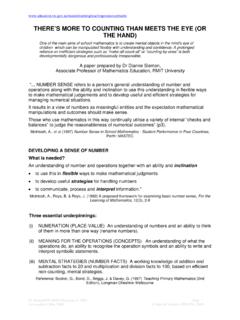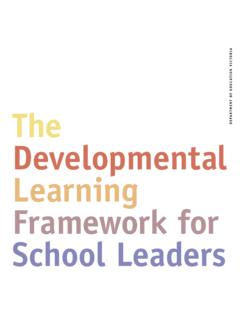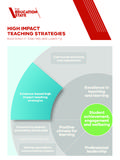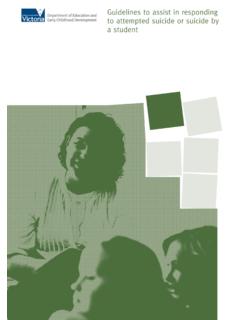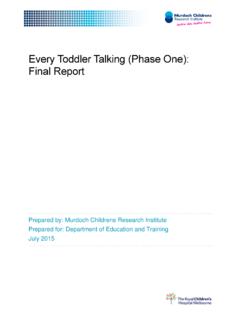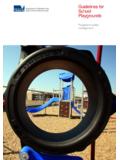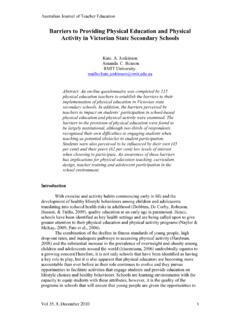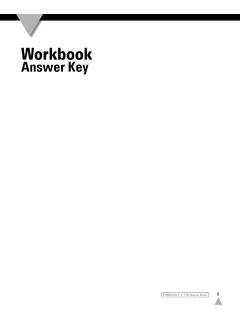Transcription of Healthy eating in the National Quality Standard
1 Healthy eating in the National Quality Standard A guide for early childhood education and care services State of Victoria (Department of Education and Training) 2019 Healthy eating in the NQS is provided under a Creative Commons Attribution International licence. You are free to re-use the work under that licence, on the condition that you credit the State of Victoria (Department of Education and Training), indicate if changes were made and comply with the other licence terms, see: Creative Commons Attribution International The licence does not apply to: any images, photographs, trademarks or branding, including the Victorian Government logo and the DET logo; and content supplied by third parties. Copyright queries may be directed to ACKNOWLEDGEMENTS This document was made in collaboration with Nutrition Australia Vic Division and the Department of Health and Human Department of Education acknowledges the contribution of Margaret Rozman, Jessica Kempler, Amy Rossignoli, and Amy Wakem from Nutrition Australia Vic Division.
2 This document is also available on the internet at State of Victoria (Department of Education and Training) 2019 Healthy eating in the NQS is provided under a Creative Commons Attribution International licence. You are free to re-use the work under that licence, on the condition that you credit the State of Victoria (Department of Education and Training), indicate if changes were made and comply with the other licence terms, see: Creative Commons Attribution International The licence does not apply to: any images, photographs, trademarks or branding, including the Victorian Government logo and the DET logo; and content supplied by third parties. Copyright queries may be directed to Contents Introduction Error! Bookmark not defined.
3 How to use this guide 4 Background 5 The National Quality Standard 5 Guiding principles 6 Links with health programs and services 6 Definitions 7 Section 1 - Exceeding themes explained 9 Section 2 Guides 13 Guide A: Long day care services providing food and beverages 13 Guide B: Outside school hours care services providing food and beverages 15 Guide C: Family day care services providing food and beverages 18 Guide D: Kindergarten and other education and care services where food and beverages are not provided by the service 21 Additional information and resources 23 Healthy eating Advisory Service 23 Lunchbox and educational resources 25 The Australian Breastfeeding Association 25 Government guidelines and resources 25 Programs 26 State of Victoria (Department of Education and Training) 2019 Healthy eating in the NQS is provided under a Creative Commons Attribution International licence.
4 You are free to re-use the work under that licence, on the condition that you credit the State of Victoria (Department of Education and Training), indicate if changes were made and comply with the other licence terms, see: Creative Commons Attribution International The licence does not apply to: any images, photographs, trademarks or branding, including the Victorian Government logo and the DET logo; and content supplied by third parties. Copyright queries may be directed to Introduction The National Quality Framework1 helps children get the best start in life by raising Quality and consistency in education and care services across Australia, including kindergartens, long day care, family day care, and outside school hours care. An important objective of the National Quality Framework is to ensure the safety, health and wellbeing of all children attending education and care services.
5 The purpose of this resource is to assist education and care services to provide appropriate nutrition to children, promote Healthy eating and meet the requirements of element of the National Quality Standard2 (NQS) and the National Legislation which comprises the Education and Care Services National Law Act 20102 ( National Law) and the Education and Care Services National Regulations 20112 ( National Regulations). Anyone involved in promoting Healthy eating or providing food and beverages to children in care in Australia can use this resource. This includes directors, coordinators, early childhood teachers, educators, cooks and other staff. Authorised officers can also use this resource to assist them in determining whether education and care services meet the requirements of element of the NQS and the National Legislation. How to use this guide The information in this resource is divided into two sections to cover the three rating levels.
6 Section 1 considers the exceeding themes, and section 2 provides guidance on working towards and meeting ratings. Section 1 - Exceeding themes Exceeding themes explained Section 2 - Guides Follow the guides according to the type of service: Guide A: Long day care services providing food and beverages Guide B: Outside school hours care services providing food and beverages Guide C: Family day care services providing food and beverages Guide D: Kindergarten and other education and care services where food and beverages are not provided by the service Each guide provides examples of how providers, services, nominated supervisors and educators might meet their obligations under the NQS and National Legislation. This guide does not replace the NQS and National Legislation and is provided solely for guidance and assistance.
7 Approved providers and those working directly with children should read and understand the NQS and National Legislation. As a general approach, each guide highlights key items of the NQS and National Legislation but it is not exhaustive. This information is provided as guidance only. 1 Information about the National Quality Framework is available at: 2 Available at: 5 Background Education and care services must meet the requirements of the National Quality Framework; the National Law, the National Regulations and the NQS. The National Quality Standard Education and care services are assessed and rated against the NQS. There are seven Quality areas, each containing standards and elements. Healthy eating and children s nutrition is included in Quality Area 2 - Children s health and safety.
8 Quality Area 2 - Children s health and safety Quality Area 2 - Children s health and safety focuses on supporting and promoting children s health and safety when they are attending education and care services. In particular, element states that: Healthy eating and physical activity are promoted and appropriate for each child. What are the requirements for Healthy eating and children s nutrition? The NQS and National Regulations require that all services (whether or not they provide food and beverages): actively promote Healthy eating (element ) have in place policies and procedures in relation to nutrition, food and beverages, dietary requirements and ensure policies and procedures are followed (regulations 168(2) and 170) ensure children have access to safe drinking water at all times (regulation 78) ensure children are offered food and beverages appropriate to the needs of each child on a regular basis throughout the day (regulation 78).
9 In addition, services that provide food and beverages must: ensure that food and beverage is nutritious and adequate in quantity (regulation 79) ensure that food and beverage is appropriate for each child s growth and developmental needs and cultural, religious or health requirements (regulation 79) have the weekly menu displayed and accessible to parents and carers of children being educated and cared for by the service (regulation 80) ensure that the weekly menu accurately describes the food and beverages to be provided by the service each day (regulation 80). 6 Guiding principles Information in this resource is based on principles in the: Australian Dietary Guidelines3 Get Up & Grow resources4 Victorian Menu planning guidelines for long day care, Menu planning checklist for family day care and Food and drink guidelines for outside school hours care5.
10 Links with health programs and services For education and care services in Victoria that are working towards meeting the Achievement Program s Healthy eating and Oral Health benchmarks and/or the Smiles 4 Miles award, it is desirable that the service has a meeting or exceeding rating for Standard Healthy eating Advisory Service The Healthy eating Advisory Service is funded by the Victorian Government to support early childhood services to achieve Healthy eating learning environments. The support is free of charge, we prioritise equality for all children to have access to Healthy food and only provide advice based on scientific evidence as we re a team of accredited dietitians and nutritionists. Achievement Program The Achievement Program6 is making it easier for Victorian children and adults to be healthier. The program closely aligns with the NQS and Victorian early Years Learning and Development Framework7.
